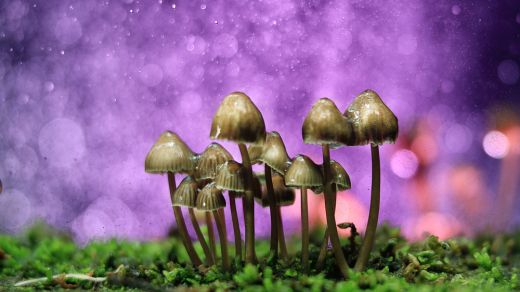Introduction
In the realm of psychedelic exploration, magic mushrooms, or more precisely, the compound they contain called psilocybin, have emerged as a subject of profound scientific interest. Beyond their recreational use, these mushrooms hold therapeutic potential that is reshaping our understanding of mental health treatment. This article delves into the science behind psilocybin, exploring its mechanisms, therapeutic applications, and the evolving landscape of psychedelic research.
Unveiling the Science of Psilocybin
Molecular Alchemy: How Psilocybin Works
Psilocybin, when ingested, undergoes a metabolic transformation into psilocin, its active form. Psilocin then interacts with serotonin receptors in the brain, particularly the 5-HT2A receptor. This interaction leads to alterations in mood, perception, and cognition, creating the characteristic psychedelic experience associated with magic mushrooms.
Neural Connectivity: Psilocybin’s Impact on the Brain
Recent studies suggest that psilocybin has the potential to induce increased neural connectivity. This neuroplasticity, or the brain’s ability to reorganize itself, may explain the lasting therapeutic effects observed in individuals who undergo psilocybin-assisted therapy. The compound appears to open a gateway for new neural connections, paving the way for transformative changes in mental processes.
The Therapeutic Potential of Psilocybin
Depression and Anxiety: Breaking the Shackles
In the realm of mental health, depression and anxiety represent significant challenges. Psilocybin therapy is showing promise as a breakthrough treatment for these conditions. Clinical trials have reported rapid and sustained reductions in symptoms, with patients often describing a profound shift in perspective and a newfound sense of emotional well-being.
Existential Distress: Navigating the Depths of Consciousness
Psilocybin’s ability to induce mystical or transcendent experiences has led researchers to explore its potential in addressing existential distress. Individuals facing the existential questions of life and death may find relief and renewed purpose through carefully guided psilocybin sessions, providing a unique avenue for existential exploration.
Addiction: Rewiring the Brain’s Reward System
Breaking the cycle of addiction is a complex endeavor, and here too, psilocybin therapy demonstrates promise. The compound’s impact on the brain’s reward system may contribute to a reevaluation of addictive behaviors. Studies indicate that individuals undergoing psilocybin-assisted therapy experience shifts in mindset, reducing cravings and fostering a greater sense of self-control.
The Importance of Set and Setting
Guided Journeys: Ensuring a Positive Experience
Psilocybin’s therapeutic potential is closely tied to the importance of a supportive environment during its consumption. Guided journeys, facilitated by experienced therapists, ensure that individuals embark on their psychedelic experience in a safe and controlled setting. This setting plays a crucial role in maximizing the therapeutic benefits while minimizing potential adverse reactions.
Integration and Support: Bridging the Psychedelic Experience with Daily Life
Post-experience integration is fundamental to the success of psilocybin therapy. Trained therapists work collaboratively with individuals to help them make sense of their psychedelic journey and integrate the insights gained into their daily lives. This ongoing support is pivotal for translating the profound experiences into lasting positive changes in mental health.
Legal and Societal Considerations
Navigating Legal Frameworks
Despite its therapeutic promise, psilocybin faces legal restrictions in many regions. However, there is a growing recognition of the need to reassess these regulations in light of emerging research. Conversations around decriminalization and controlled medical use are gaining traction, reflecting a shifting societal perspective on the potential benefits of psychedelic substances.
Public Perception and Education
Addressing the stigma associated with magic mushrooms and psilocybin is crucial for fostering a more informed and accepting society. Public education initiatives are essential to disseminate accurate information about the science of psilocybin, its therapeutic potential, and the responsible use of these substances.
The Future of Psychedelic Research
As scientific interest in psychedelics grows, so does the potential for groundbreaking discoveries. The ongoing exploration of psilocybin’s therapeutic applications opens doors to a new era of mental health treatment. Collaborations between researchers, therapists, and policymakers are essential to navigate the complexities of psychedelic research and bring about a future where these substances are integrated responsibly into mainstream mental health care.
Conclusion
Magic mushrooms and the compound within, psilocybin, are not merely agents of recreational exploration but hold the key to revolutionary advancements in mental health treatment. From the molecular level to transformative therapeutic applications, the science of psilocybin is unlocking doors to a realm where mental well-being can be approached with greater depth and nuance. As we navigate this evolving landscape, the fusion of ancient wisdom with modern science is shaping a future where the therapeutic potential of psychedelics is realized to its fullest extent.
#Psilocybine,#psilocybinetherapie,#truffelsessie,#Truffelceremonie,#psilocybineceremonie,






